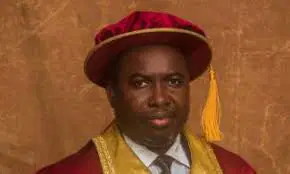By: Joy Musa
As Professor Joash Ojo Amupitan, SAN, awaits Senate confirmation for his nomination as Chairman of the Independent National Electoral Commission (INEC), questions surrounding his previous political engagements have come under scrutiny. A recent fact-check confirms that Prof. Amupitan was a key member of President Bola Ahmed Tinubu’s legal team during the 2023 presidential election petition tribunal.
Prof. Amupitan, a distinguished legal scholar and professor of law at the University of Jos, served as lead counsel representing the All Progressives Congress (APC) and President Tinubu in the tribunal proceedings. These hearings were convened to examine the challenges raised by the Peoples Democratic Party (PDP) and the Labour Party (LP) following the February 2023 general elections.
Key Role in the Legal Defense
In his capacity as lead counsel, Prof. Amupitan contributed significantly to the APC’s defense strategy, which aimed to uphold the validity of the election results amid allegations of irregularities and non-compliance with electoral laws.
The defense, under the overall coordination of Chief Wole Olanipekun, SAN, argued that the petitioners failed to provide sufficient evidence to warrant overturning the election outcome. Prof. Amupitan focused on critical aspects such as legal precedents on electoral conduct, evidence admissibility, and procedural dismissals.
The tribunal eventually dismissed all petitions on September 6, 2023, with a unanimous verdict affirming Tinubu’s victory.
A Formidable Legal Team
The APC assembled a robust team of over 50 Senior Advocates of Nigeria (SAN), including notable figures like Lateef Fagbemi (now Attorney-General), Gordy Uche, and Adeniyi Akintola. Prof. Amupitan’s expertise in corporate governance and electoral law aligned with the defense’s emphasis on strict legal interpretations.
Public Concerns Over Potential Conflict of Interest
Following his nomination as INEC Chairman in October 2025 an appointment approved by the Council of State civil society organizations have expressed reservations about Prof. Amupitan’s past political affiliations. The Coalition of Civil Society Organizations in Nigeria (COCSON) notably called for his rejection, citing concerns that his prior role defending the APC could undermine INEC’s perceived impartiality.
Tinubu, however, defended the nomination, describing Prof. Amupitan as “apolitical and a man of integrity” capable of leading the commission with independence.
Broader Implications for Electoral Integrity
Prof. Amupitan’s involvement in the 2023 petition underscores his prominent role in Nigeria’s high-profile electoral disputes. His extensive legal career, spanning over three decades, has seen him engage in complex corporate and constitutional matters.
Critics argue that appointing a former political defense counsel to head the nation’s electoral body risks eroding public confidence, especially as Nigeria prepares for future elections.
Next Steps
The Senate is expected to review Prof. Amupitan’s nomination in the coming weeks. Observers say the confirmation process will likely be rigorous, with lawmakers weighing his legal credentials against concerns about electoral neutrality.
As Nigeria continues to grapple with challenges around election credibility, the appointment of an INEC chairman remains a critical factor in shaping the country’s democratic trajectory.
Editor’s Note: This report is based on verified sources, including official tribunal records and statements from civil society groups. Prof. Joash Amupitan has yet to respond publicly to these concerns.







